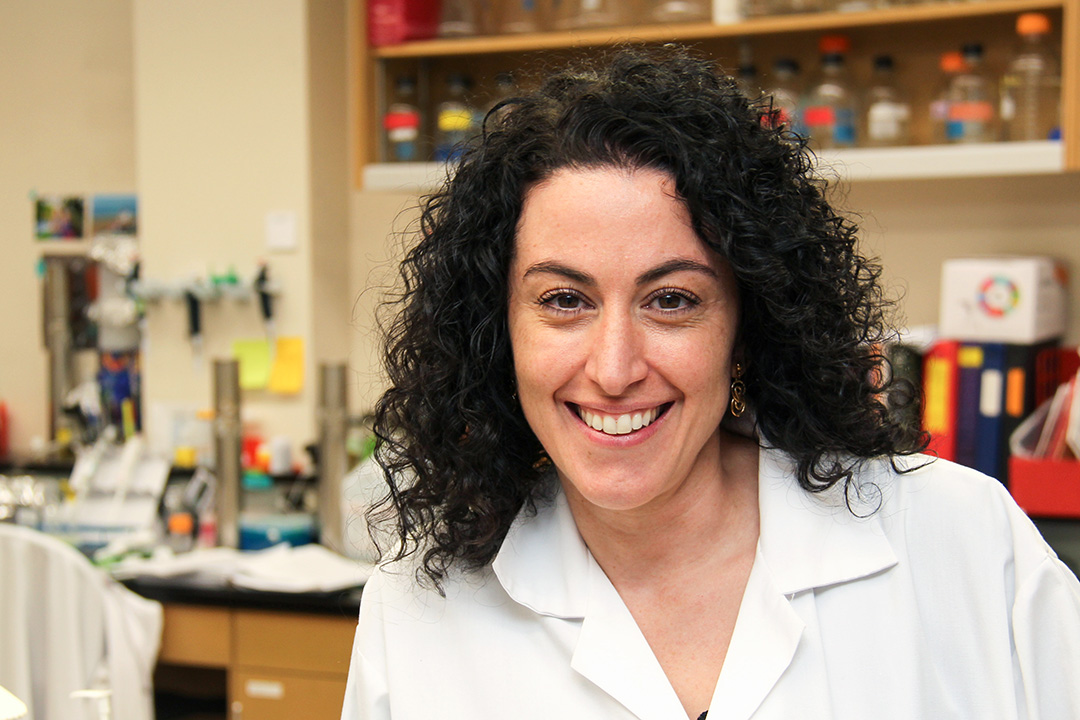
Chelico looking for answers at molecular level
Much of Dr. Linda Chelico’s (PhD) success in her career as a biochemist at the University of Saskatchewan (USask) comes from having an eye for detail.
By Kristen McEwen“You have to have something that really drives you and interests you,” Chelico said of her work, which largely focuses on studying cellular mechanisms and functions. “I think it’s always important in science to also appreciate that larger picture.”
In 2019, Chelico was awarded more than $1.6 million for two separate Canadian Institutes of Health Research (CIHR) projects. Her team is investigating how a family of 11 proteins, called APOBEC enzymes, interact with the human immunodeficiency virus (HIV) and contribute to cancer when not regulated properly.
Saskatchewan has one of the highest levels of HIV in the country. The HIV virus attacks the body’s immune system, leaving it more vulnerable to infection. According to the Canadian Cancer Society, one in two Canadians will develop cancer and one in four will die of the disease.
“In humans, the immune system can change the DNA in certain immune cells to adapt to new pathogens that we encounter in our lifetime,” Chelico said.
When left unchecked the enzymes can alter the DNA of a human cell, causing mutations and cancerous cells.
Chelico has always been interested in the mechanisms that change DNA at the molecular level, whether it’s been from the perspective of medicine or agriculture. As a USask microbiology student, Chelico decided to venture into agricultural microbiology in what is now the Department of Food and Bioproduct Sciences. There, she obtained her Bachelor of Science in Agriculture and PhD.
“I really was fascinated by the role micro-organisms have in the environment,” Chelico said. “They make up the majority of the biomass of soil. They can change so many things, including our water system.”
From there she received a post-doctoral fellowship at the University of Southern California, Los Angeles. It was a major move for someone who was raised in small-town Saskatchewan.
“It was a big thing to go from Melfort to Saskatoon to there,” Chelico said. “I had wanted to move to a bigger city for my PhD, but my mom didn’t want me to go that far.”
But, she could not resist the job offer from Dr. Myron Goodman (PhD), who has done pioneering work in the field of enzymatic causes of DNA mutations. While in L.A., Chelico found her passion for studying the APOBEC enzymes, and their impact on human DNA. While she enjoyed the work in agriculture, she was more interested in medical research.
“In medical research there’s more room to do basic science, discovery of information,” Chelico said. “There’s lots of fields that we don’t know, we don’t have enough information to translate it into something.”
After she completed her fellowship she returned to USask in 2009 for a faculty position in the College of Medicine and to be closer to her family. Chelico wanted to find her own research path and noticed there was a gap in HIV research from a molecular studies perspective.
She received her first Tri-Agency funding in 2010 from the Natural Sciences and Engineering Research Council of Canada (NSERC) and CIHR to characterize APOBEC enzymes and study how they interact with HIV.
Chelico recognizes the challenges that come with applying for funding to help get research projects off the ground. For individuals starting a career in research, it is essential to establish a good publication record, or collaborate with others to create one.
She also recommends using internal resources in the university to help with applying for funding, such as utilizing research facilitators and attending seminars.
And if an idea for a project is rejected, it’s important to understand constructive criticism.
“It’s hard sometimes if someone has an idea and it doesn’t get funded,” Chelico said. “It’s difficult, but divorce yourself from your ideas … It’s important to listen to people.”

